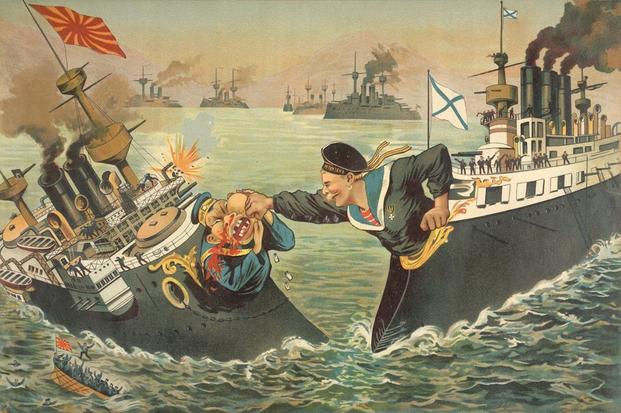Some things are universal. If you're going to start a war, make sure you're also the one who finishes it. To be ill-prepared for any reason is dumb and just prolongs a war, yielding pointless loss of life. In the history of the world, wars have been prolonged and lost for many, many stupid reasons.
Things like ignorance, hubris and incompetence come to mind.
"You go to war with the Army you have, not the Army you might wish you have." (Department of Defense)
Racism is all three of those things. Especially when a leader is about to send thousands -- or even tens of thousands -- of his most loyal troops into a situation they can't possibly win, because that leader thinks victory is assured just because he's white. Or Chinese. Or Japanese. So, let's be honest with ourselves: The most spectacular examples of military leadership did not belong to any one race.
As a matter of fact, if there's any one person who can claim dominance over all other military minds, you don't have to worry about race for two reasons. First, because he killed nearly everyone. Second, because he had sex with all the survivors and most of us are related to him anyway.
When a country goes to war, it needs to come prepared to earn that win. No army, weak or obsolete, is going to just let anyone roll all over them, because the invader thinks they're genetically or racially superior. Yet, in the history of warfare, it happens over and over again.
1. Battle of Isandlwana
The British had been in Africa for a long time and were pretty good at subduing natives by 1879. Experience taught them that small groups of European forces with superior technology could outgun native warriors, even if they were outnumbered.
It turns out there was a diminishing rate of return to that theory.
British forces in South Africa prepared to invade Zulu with less than 1,800 redcoats and colonial troops, a few field guns and some rockets. They made zero effort at preparing defensive positions. The British didn't even bother to scout or recon where the opposing Zulu force was. If they had, they would have known much sooner that their camp was surrounded by 20,000 Zulu Impi.
The Impi slaughtered the British; they just absolutely creamed them. Though the redcoats fought fiercely, 20,000 is a hard number to beat. Despite a British victory later at Rorke's Drift, their invasion of Zululand fell apart. The worst part is that the British high commissioner for Southern Africa didn't even have to invade. He just wanted to depose the elected government and federalize South Africa. No one authorized his invasion. He just thought so little of the Zulus that he figured it must be an easy task.
But the British had to finish what they started. The second time the British invaded Zululand (because, of course, they did), they brought more men and technology to claim a decisive victory.
2. The Battle of Adwa
Italian forays into colonizing Africa didn't always go according to plan. When carving up Africa for colonization, the other European powers seemed to leave the most difficult areas to subdue for Italy. The Italian army had to subjugate modern-day Libya, Somalia, Eritrea and Ethiopia. How do you think that went?
In another example of "we're white so we must be better" thinking, the Italians, who barely got themselves together as a country in 1861, tried to exploit Ethiopia, an already rich, complex and advanced society. Italy tried to misinterpret a treaty signed with Ethiopia to subdue it as a client state, but Ethiopian Emperor Menelik II wasn't having any of it. So the Italians invaded.
After a year of fighting, they made it deep into Ethiopian territory. But as both armies began to struggle to feed themselves, the Italian government wanted a break in the stalemate. Instead of an orderly retreat, the Italians attacked, considering 17,000 Italians with old guns, versus more than 100,000 Ethiopian troops, would be less embarrassing than having retreated before Ethiopians.
Well, the Italians mostly died -- but they didn't have to. The Ethiopians not only had significantly more manpower; they weren't exactly armed with spears, either. They also had rifles. And cavalry. And more of everything on their home turf. The Italian invasion was just a bad idea from the start.
The Italians were pretty much annihilated at Adwa, with more than 10,000 killed, captured or wounded. For Ethiopia, it guaranteed their independence from European meddling or subjugation, forcing Italy to recognize Ethiopia as such -- at least, until Benito Mussolini came to call with airplanes and chemical weapons.
3. The Russo-Japanese War
At the turn of the 20th century, Japan and Russia were in direct competition for dominance over Korea and Chinese Manchuria. Russia was expanding the Trans-Siberian Railway to reach its eastern shores, and did so through China, eventually expanding to the city of Port Arthur -- which the Japanese thought they'd won in a previous war with China. Both Russia and Japan became convinced a war was coming. Because it was.
For some reason (racism), the Russians didn't seem worried. They were far away from any kind of reinforcement, and the Japanese had an advantage in manpower and proximity. But the "yellow monkeys," as they were portrayed in the Russian press, gave the Russian military zero pause. The czar and his advisers were sure Russia would win any war with an Asian country. Japan repeatedly attempted to negotiate with the Russians but to no avail. War was easily averted, but the czar was sure Japan wouldn't attack.
Since Russia had advisers with Menelik II in Ethiopia, you'd think they'd be wary of racist overconfidence, but you'd be wrong. Because Japan attacked.
When Japan attacks, they do it in a big way. They attacked the Russian Far East Fleet and bottled it up at Port Arthur, destroying it with land-based artillery. Japan then captured all of Korea in two months. They then moved into Manchuria as the Russians fell back, waiting for land reinforcements via the Trans-Siberian Railway and the Russian Baltic Fleet, which pretty much had to circumnavigate the globe to get to the war.
Neither was put to good use. Russia lost 90,000 troops when the Japanese captured the Manchurian capital at Mukden. And the Baltic Sea Fleet (now called the 2nd Pacific Fleet) was annihilated by the Japanese on its way through the Tsushima Strait.
4. World War II in the Pacific
Well, just as the Russians proved they learned nothing about racism by watching Menelik trounce the Italians, the Japanese learned nothing about racism from their victory over Russia.
By 1937, the Japanese were coming out of the Great Depression, well before the rest of the world. Coupled with significant military victories against China, Russia and in World War I, Japan was riding pretty high. But this isn't the start of the Japanese superiority complex. The country actually tried to have a race equality declaration written into the League of Nations.
But we all know how well the League of Nations turned out.
The Japanese became contemptuous of white Americans and Europeans and saw themselves as a superior race. The inferior white races were considered soft and weak in comparison. When Japanese officials were met with racism while visiting foreign countries, it only exacerbated the issue.
They saw whites as overly individualistic, a society that would crumble at the first sign that it needed to unify or die. Japan soon came to believe its divine role was to be the champion of Asians and to liberate the colonies of the Western powers. Their view of themselves as a superior race was so extreme, it would weigh heavily on the Asian people they "liberated."
But before any of that happened ...
Dec. 7, 1941
The fact is that American citizens didn't really want the U.S. to go to war with Japan. But Japan needed raw materials to continue their campaign in Asia. So when the United States cut them off from American oil and scrap metal, there was only one way to go about getting it.
Just kidding. There were many ways Japan could maintain its expansion in Asia without bombing Pearl Harbor or going to war with Europe, but it opted to bomb the Americans, who had the only fleet that could stop the Japanese Navy, and then take oil and rubber from the British and Dutch colonies in Asia. The Japanese thought if they destroyed the U.S. fleet, then America would just give up and let them have it.
That's how weak-willed the Japanese thought Americans were. That line Adm. Isoroku Yamamoto supposedly said about waking a sleeping giant? He never said that. But Japan found out pretty quickly about these guys called "U.S. Marines."
Japan's leadership knew they couldn't win a long war against the U.S., but it was their racial bias that led them to believe the Americans would just give up after Pearl Harbor. They had led themselves to believe Japan was invincible so much that losing the war came as a shock and surprise to most of the Japanese people.
More articles from We Are the Mighty:
- Watch the Air Force Academy's top commander tell racists 'to get out'
- This naval battle helped set the stage for two world wars
- 6 simple reasons the Union won the Civil War
We Are The Mighty (WATM) celebrates service with stories that inspire. WATM is made in Hollywood by veterans. It's military life presented like never before. Check it out at We Are the Mighty.
Keep Up With the Best in Military Entertainment
Whether you're looking for news and entertainment, thinking of joining the military or keeping up with military life and benefits, Military.com has you covered. Subscribe to the Military.com newsletter to have military news, updates and resources delivered straight to your inbox.
















